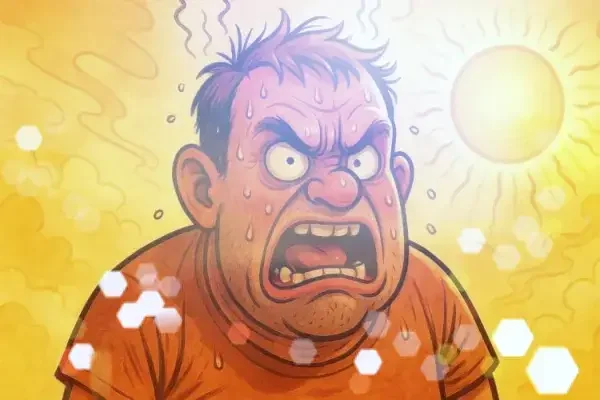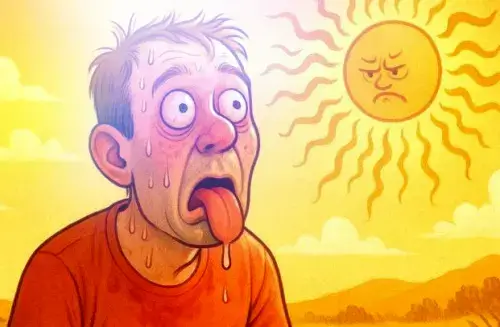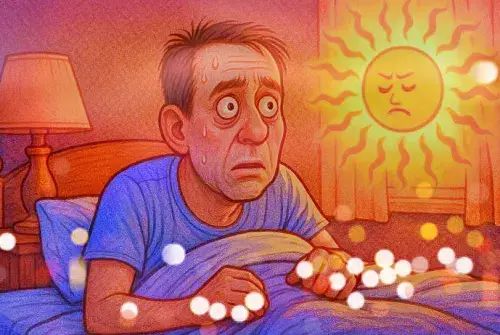Heat. It’s a classic summer paradox. The sun is shining, the days are long, and the world seems to be bursting with life. Yet, as the mercury rises, people often transform.
Friendly neighbors become short-tempered, coworkers make uncharacteristic mistakes, and our own minds seem to slow to a crawl.
We might feel a wave of inexplicable grumpiness or find ourselves forgetting simple things, like where we left our keys. It’s easy to dismiss these changes as a simple case of “summer blues” or a personal quirk, but the truth is far more scientific and compelling.
The scorching heat isn’t just making us uncomfortable; it’s profoundly altering our brain chemistry and putting our physical and mental health at risk.
Heat, the Cognitive Toll.
Why Your Brain Goes on Vacation.
When the thermometer spikes, it’s not just your makeup that melts your cognitive function can, too. Your brain, that brilliant three-pound organ, is a surprisingly sensitive machine.
It thrives in a stable, temperate environment, and any significant deviation from its ideal operating temperature of around 98.6°F (37°C) can throw a wrench into its complex workings.
Think of your brain as a high-performance computer. It generates a tremendous amount of heat, and a sophisticated cooling system.
Your body’s circulatory system keeps it from overheating. In an ideal state, your brain uses about 20% of your body’s energy.
But when the ambient temperature rises, your body must work overtime to dissipate this excess heat. Your heart rate increases, and your blood vessels dilate to pump more blood to the skin’s surface, where heat can be released.
This process, while essential for survival, diverts blood flow away from the brain’s crucial decision-making and concentration centers.
The result is a literal “brain drain,” where the very organ responsible for clear thinking is operating with less than its usual resources.
Scientists have documented this phenomenon for decades. Studies have shown a clear correlation between high temperatures and a decrease in cognitive performance.
People make more errors on complex tasks, their reaction times slow down, and their ability to focus and solve problems diminishes. One study, for instance, found that students performed significantly worse on standardized tests when their dorm rooms were hot.
The reason isn’t laziness; it’s a physiological reality. Heat impairs the communication pathways between neurons.
The electrical signals that allow your brain cells to talk to each other become less efficient, leading to what feels like a mental fog or a “lag” in your thoughts.
You literally start to “slow down.” This state makes it harder to make sound judgments, increases risk-taking behavior, and can make you more likely to snap at a minor inconvenience.
From Grumpy to Genuinely Angry.
The Emotional Impact of Heat.
The link between heat and mood isn’t just about feeling a little irritable. It’s a significant factor in human behavior, so much so that it’s been linked to an increase in aggressive and violent acts.
While the full picture is complex, part of the explanation lies in the brain’s reduced capacity for emotional regulation.
When your brain is struggling to regulate its temperature and maintain basic cognitive functions, its higher-order processes, like emotional control, are often the first to suffer.
The prefrontal cortex, the area of the brain responsible for impulse control and rational thought, becomes less active. This weakens your ability to filter out negative feelings or think through the consequences of your actions.
At the same time, the amygdala, the brain’s “fear and anger center,” can become more easily triggered. This creates a perfect storm where a small annoyance a traffic jam, a crying child, a spilled drink can quickly escalate into a full-blown emotional outburst.
Furthermore, the stress of dealing with heat triggers the release of stress hormones like cortisol. While a little cortisol can be helpful in a “fight-or-flight” situation, a constant, low-level elevation of this hormone can lead to chronic irritability, anxiety, and a feeling of being on edge.
Your body is essentially in a state of mild, prolonged stress, and it’s no wonder that your temper becomes shorter. This isn’t just a personal failing; it’s a physiological response to a hostile environment.
More Than a Mood Killer.
The Serious Health Risks of High Temperatures.
Beyond making us grumpy and forgetful, extreme heat poses a direct and serious threat to our physical health. It’s a silent killer that exacerbates existing conditions and can create new ones. The most immediate danger is, of course, heatstroke, but the long-term effects are just as concerning.
One of the most vulnerable systems is the cardiovascular system. Your heart, already working harder to pump blood to cool the body, is put under immense strain. This is particularly dangerous for the elderly and those with heart conditions, as it can lead to heat-related heart attacks and other cardiovascular events.
Heat also disrupts the body’s delicate internal barriers.
Elevated body temperature can compromise the blood-brain barrier, a protective filter that prevents harmful substances from reaching the brain.
This makes the brain more susceptible to inflammation, viruses, and toxins, which can lead to or worsen neurological conditions. For example, some studies suggest that extreme heat can increase the frequency of seizures in individuals with epilepsy.
The disruption of sleep is another major problem. High temperatures make it difficult to fall and stay asleep, leading to a state of chronic sleep deprivation.
A lack of quality sleep has been linked to a host of problems, including a weakened immune system, poor mood regulation, and further cognitive decline. It’s a vicious cycle: the heat makes you tired, and being tired makes you less able to cope with the heat.
The elderly, children, and pregnant women are particularly at risk. The elderly often have impaired thermoregulation, meaning their bodies are less efficient at cooling down.
They may also suffer from dementia, causing them to forget to drink water or recognize the signs of heat stress. For children, their bodies heat up faster than adults, and they are less able to communicate that they are unwell.
In pregnant women, heat can increase the risk of premature birth, which has long-term implications for the child’s development. As global temperatures continue to rise, these vulnerable populations will face increasingly severe threats.
The Ultimate Survival Guide.
What to Drink and What to Avoid.
Amidst all these risks, there is a simple and effective strategy to mitigate the dangers of heat: stay hydrated. Dehydration is a real and present threat, not a myth.
Losing even just 2% of your body’s water can impair cognitive function, while a 10% loss can lead to serious health complications, including organ failure.
This is why it’s recommended that adults drink at least 2 liters of water daily, and even more in the heat, especially if you are active.
But not all drinks are created equal. The key is to choose beverages that truly rehydrate without putting an extra burden on your body.
What to Drink?
The Best Hydration Choices.
Plain Water.
The undisputed champion of hydration. It’s absorbed quickly and efficiently by the body, replenishing lost fluids without adding calories, sugar, or other substances that require your body to work harder. Keep a reusable water bottle with you and sip throughout the day, even before you feel thirsty.
Green or Herbal Tea.
This might seem counterintuitive, but a warm or room-temperature tea can be more effective at cooling you down than a cold drink. The warm liquid signals your body to start sweating, which is its natural cooling mechanism.
Green tea and herbal teas like mint, chamomile, or lemon balm are excellent choices. They contain antioxidants and can provide a mild, steady energy boost without the jitters of coffee.
The tannins in green tea can also protect mucous membranes and blood vessels, while B vitamins and carotene support nerve function and vision.
Diluted Fruit or Berry Juice.
While pure juice is high in sugar and should be treated as a food, a diluted version (a 50/50 mix with water) can be a great option. The natural sugars and electrolytes from fruits like cranberries, oranges, or grapefruit help maintain your body’s essential water-salt balance, which is crucial for proper nerve and muscle function.
Mineral Water.
For some, especially those who have been sweating heavily, mineral water can be beneficial. However, it’s best to consult a doctor before making it your primary beverage, as some types are high in salts and are intended for therapeutic use.
What to Avoid.
The Dehydration Traps.
Sugary Sodas and Energy Drinks.
These are a double-edged sword. The high sugar content requires your body to use water for digestion, and the caffeine in some of them acts as a diuretic, causing you to lose even more fluid.
They may feel refreshing for a moment, but they ultimately intensify your thirst and contribute to dehydration.
Strong Alcohol.
Alcohol is a potent diuretic. It suppresses a hormone called vasopressin, which is responsible for regulating water retention. As a result, you urinate more, losing precious fluids and electrolytes.
A cold beer might seem like a good idea on a hot day, but it’s a surefire way to speed up dehydration.
Milkshakes and Creamy Drinks.
These are high in fat and protein, which can slow down digestion and increase your body’s metabolic heat production. They are more like a meal than a drink and will not effectively quench your thirst.
In conclusion, the next time a heatwave hits, remember that your irritability and brain fog are not just in your head.
They are a physiological response!
By understanding how heat impacts your mind and body, and by making simple, smart choices about what you drink, you can protect your health and stay sharp, even when the temperature soars.
Have a Great Day!





